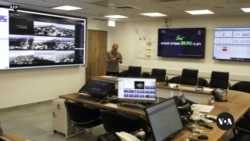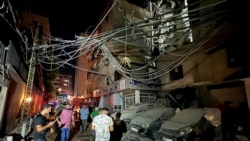ເກືອບສອງອາທິດຫລັງການລອບສັງຫານຜູ້ນຳຂັ້ນສູງຂອງກຸ່ມຫົວຮຸນແຮງສອງຄົນ ທີ່ຖືກກ່າວຫາວ່າດຳເນີນການໂດຍອິສຣາແອລ, ບັນດາຊາວ ອິສຣາແອລ ກໍາລັງລໍຖ້າດ້ວຍຄວາມກັງວົນ ກ່ຽວກັບການຕອບໂຕ້ທີ່ຄາດການວ່າຈະເກີດຂຶ້ນ. ທັງ ກຸ່ມຮາມາສ ແລະ ເຮັສໂບລລາ ຕ່າງກໍມີທ່າແຮງທີ່ຈະໂຈມຕີອິສຣາແອລ ສ່ວນໃຫຍ່ດ້ວຍລູກສອນໄຟ ໄລຍະໄກ ແລະສ້າງຄວາມເສຍຫາຍຢ່າງກວ້າງຂວາງ. ແຕ່ພວກເຂົາເຈົ້າຍັງບໍ່ຕ້ອງການເຮັດສົງຄາມແບບເຕັມຮູບແບບກັບອິສຣາແອລ. ລິນດາ ແກຣດສໄຕນ໌ (Linda Gradstein) ລາຍງານຈາກເຈຣູຊາແລ້ມ.
ເມືອງ ໄຮຟາ (Haifa) ທາງພາກເໜືອທີ່ຢູ່ຫ່າງຈາກຊາຍແດນກັບປະເທດ ເລບານອນພຽງແຕ່ 32 ກິໂລແມັດ, ມີທ່າເຮືອ ແລະໂຮງງານຜະລິດເຄມີທີ່ອາດຕົກເປັນເປົ້າໝາຍ ການໂຈມຕີຂອງກຸ່ມ ເຮັສໂບລລາ.
ຫຼັງຈາກວັນທີ 7 ຕຸລາ, ເມື່ອກຸ່ມຮາມາສໄດ້ດຳເນີນການບຸກໂຈມຕີກໍ່ການຮ້າຍຢູ່ພາກໃຕ້ ຂອງ ອິສຣາແອລ, ເຊິ່ງໄດ້ພາໃຫ້ເກີດມີສົງຄາມຢູ່ໃນເຂດກາຊາ, ສູນບັນຊາການສຸກເສີນ ໄຮຟາ (Haifa) ຖືກຍ້າຍລົງໃຕ້ດິນ ເນື່ອງຈາກກຸ່ມ ເຮັສໂບລລາ ແລະ ອິສຣາແອລ ໄດ້ຍິງປືນໃສ່ກັນໄປມາ ຂ້າມຊາຍແດນອິສຣາແອລ ກັບ ເລບານອນ.
ເຈົ້າໜ້າທີ່ຂອງເມືອງກ່າວວ່າ ເມືອງ ໄຮຟາ (Haifa) ກຽມພ້ອມສໍາລັບການໂຈມຕີ.
ທ່ານ ລີໂອນິດ ເຣຊນິກ (Leonid Reznik), ຫົວຫນ້າດ້ານການກຽມການສຳລັບເຫດ ການສຸກເສີນຢູ່ໃນເຂດເທດສະບານ ເມືອງ ໄຮຟາ ກ່າວວ່າ:
"ຂຸມຫຼົບໄພຂອງພວກເຮົາທັງຫມົດ ຈະເປີດໂດຍອັດຕະໂນມັດໃນກໍລະນີມີການເຕືອນ. ຫຼືຖ້າຂ້າພະເຈົ້າ ຕັດສິນໃຈເປີດມັນ, ຕົວຢ່າງເຊັ່ນ ຕອນນີ້ຂ້າພະເຈົ້າ ກໍາລັງເປີດມັນ ຈາກໂທລະສັບ, ທ່ານຈະເຫັນແສງໄຟເປີດຢູ່, ນັ້ນຫມາຍຄວາມວ່າຂຸມຫຼົບໄພກຳລັງເປີດຢູ່.
ທັງ ກຸ່ມຮາມາສ ແລະ ເຮັສໂບລລາ ຕ່າງກໍໄດ້ສັນຍາວ່າຈະຕອບໂຕ້ ຕໍ່ການລອບສັງ ຫານເມື່ອໄວໆນີ້. ເຈົ້າໜ້າທີ່ຄວາມໝັ້ນຄົງຂອງອິສຣາແອລ ກ່າວວ່າ ກຸ່ມຫົວຮຸນແຮງ ເຮັສໂບລລາ ມີລູກສອນໄຟຫຼາຍກວ່າ 150,000 ລູກ ທີ່ສາມາດໂຈມຕີໄດ້ເກືອບທັງໝົດປະເທດອິສຣາແອລ.
ທ່ານ ອາວີ ເມລາເມັດ (Avi Melamed), ນັກວິເຄາະຂໍ້ມູນລັບຍຸດທະສາດ ກ່າວເປັນພາສາອັງກິດ ກັບວີໂອເອ ຜ່ານທາງ ຊູມວ່າ:
"ກຸ່ມເຮັສໂບລລາ ທີ່ມີເຮືອບິນບໍ່ມີຄົນຂັບທີ່ຜະລິດໂດຍອີຣ່ານ ແລະຄວາມຊໍານານ, ສາມາດສ້າງຄວາມເສຍຫາຍຢ່າງຫຼວງຫຼາຍ ຕໍ່ໂຄງສ້າງພື້ນຖານຂອງ ອິສຣາແອລ, ໂດຍສະເພາະແມ່ນ ຍ້ອນຄວາມຈິງທີ່ວ່າເກືອບຈະບໍ່ມີເວລາທີ່ຈະສະກັດ ເຮືອບິນບໍ່ມີຄົນຂັບ ແລະຈະຫຼວດຂອງກຸ່ມເຮັສໂບລລາ ທີ່ກຳລັງເຂົ້າມາ ແລະນອກຈາກນີ້ ກໍ່ແມ່ນຍ້ອນຄວາມ ຈິງທີ່ວ່າ ຈະຫຼວດບາງສ່ວນ ຍັງສະກັດໄດ້ຍາກຫຼາຍ ອີກດ້ວຍ."
ກອງທັບອິສຣາແອລ ກ່າວວ່າ ຕົນໄດ້ພັດທະນາເທັກໂນຈີໃໝ່ເພື່ອເຕືອນຊາວອິສຣາແອລ ກ່ຽວກັບການໂຈມຕີດ້ວຍລູກສອນໄຟທີ່ເຂົ້າມາໃນເຂດຂອງຕົນ.
ໃນເດືອນເມສາທີ່ຜ່ານມາ, ອີຣ່ານໄດ້ໂຈມຕີອິສຣາແອລໂດຍກົງເປັນເທື່ອທຳອິດ ດ້ວຍລູກສອນໄຟຫຼາຍຮ້ອຍລູກ, ເຊິ່ງສ່ວນໃຫຍ່ຖືກ ອິສຣາແອລ, ສະຫະລັດ ຫຼືຈໍແດນ ຍິງຕົກ. ນັກວິເຄາະຂອງອິສຣາແອລ ຄາດວ່າຈະມີການໂຈມຕີທີ່ໃຫຍ່ກວ່າເກົ່າ ແລະກວ້າງຂວາງ ຂື້ນ ໃນຄັ້ງນີ້.
ແນວໃດກໍຕາມ, ນັກວິເຄາະແຜນຍຸດທະສາດ ທ່ານ ອາວີ ເມລາເມັດ ກ່າວວ່າ ບໍ່ມີພາກສ່ວນກ່ຽວຂ້ອງໃດ ໃນພາກພື້ນນີ້ ຕ້ອງການສົງຄາມເຕັມຮຸບແບບ.
ທ່ານ ອາວີ ເມລາເມັດ (Avi Melamed), ນັກວິເຄາະຂໍ້ມູນລັບຍຸດທະສາດ ກ່າວເປັນພາສາອັງກິດ ກັບວີໂອເອ ຜ່ານທາງ ຊູມວ່າ:
“ບັນຫາຂອງອີຣ່ານ ແມ່ນການຕອບໂຕ້ ຄືທີ່ພວກເຂົາໄດ້ໃຫ້ຄຳໝັ້ນສັນຍາໄວ້ວ່າ ຈະແກ້ແຄ້ນ, ຈະດຳເນີນການລົງໂທດຕາມທີ່ພວກເຂົາເຈົ້າໄດ້ປະຕິຍານໄວ້, ແຕ່ຈະຕ້ອງດຳເນີນການໃນລັກສະນະທີ່, ໃນດ້ານນຶ່ງແມ່ນ, ເພື່ອຈະຟື້ນຟູກຽດສັກສີ, ກຽດສັກສີທີ່ໄດ້ຮັບຄວາມເສຍຫາຍ. ພາບລັກທີ່ຖືກຂົ່ມຂູ່. ແຕ່ການເຮັດເຊັ່ນນັ້ນ, ໃນອີກດ້ານນຶ່ງ, ກໍຕ້ອງດຳເນີນການໃນລັກສະນະທີ່ ຈະບໍ່ພາໃຫ້ເກີດສະຖານະການທີ່ ອິສຣາແອລ ຈະຕອບໂຕ້ຢ່າງຮຸນແຮງ ແລະສ້າງສະຖານະການທີ່ພວກເຂົາ ຈະພົບວ່າຕົນເອງ ຢູ່ໃນສະຖານະການທີ່ພວກເຂົາເຈົ້າ ຕ້ອງການທີ່ຈະຫລີກລ້ຽງທັງໝົດ. ນີ້ແມ່ນການຍົກລະດັບຄວາມຮຸນແຮງອັນໃຫຍ່ຫຼວງກັບ ອິສຣາແອລ.”
ສະຖານະການແມ່ນສັບສົນຂຶ້ນຕື່ມອີກ ໂດຍການເຈລະຈາທາງອ້ອມ ຮອບໃຫມ່ ລະຫວ່າງອິສຣາແອລ ແລະ ກຸ່ມຮາມາສ ເພື່ອຢຸດຍິງ ແລະປ່ອຍຕົວຕົວປະກັນທີ່ກຸ່ມ ຮາມາສ ຈັບໂຕໄປ ໃນການໂຈມຕີໃນເດືອນຕຸລາ. ສະຫະລັດ ໄດ້ກ່າວເຕືອນອີຣ່ານວ່າ ການຕອບໂຕ້ຕໍ່ອິສຣາແອລ ອາດຈະເຮັດໃຫ້ການເຈລະຈາດັ່ງກ່າວຫຼົ້ມແຫຼວ. ກະຊວງສາທາລະນະສຸກໃນເຂດ ກາຊາ ທີ່ຢູ່ພາຍໃຕ້ການຄວບຄຸມຂອງກຸ່ມຮາມາສ ກ່າວວ່າ ມີເກືອບ 40,000 ຄົນ, ເຊິ່ງສ່ວນໃຫຍ່ແມ່ນແມ່ຍິງ ແລະເດັກນ້ອຍ, ຖືກຂ້າຕາຍໃນການຕອບໂຕ້ທາງທະຫານຂອງ ອິສຣາແອລ.
ອີງຕາມຂໍ້ມູນຂອງອິສະຣາແອລ ແລ້ວ, ພວກນັກລົບຂອງກຸ່ມຮາມາສ ຫຼາຍພັນຄົນ ກໍລວມຢູ່ໃນຈຳນວນຜູ້ເສຍຊີວິດເຫຼົ່ານັ້ນ ນຳເຊັ່ນກັນ.
ອ່ານລາຍງານເປັນພາສາອັງກິດລຸ່ມນີ້:
Almost two weeks after the assassinations of two senior militant leaders, allegedly by Israel, Israelis are on edge waiting for expected retaliation. Both Hamas and Hezbollah have the potential to strike most of Israel with long-range missiles and cause widespread damage. But they also do not want an all-out war with Israel. Linda Gradstein reports from Jerusalem.
The northern city of Haifa is only 32 kilometers from the border with Lebanon and has a port and chemical factories that could be targets of a Hezbollah attack.
After October 7, when Hamas launched a terror attack on southern Israel, triggering the war in Gaza, the Haifa emergency command center was moved underground as Hezbollah and Israel have traded fire across the Israeli border with Lebanon.
City officials say Haifa is prepared for an attack.
Leonid Reznik is the head of emergency preparedness in the Haifa municipality:
"All our bomb shelters are opening automatically in case of the alarm. Or if I will decide to open it, for example, now I'm opening it from the phone. You can see the light is starting. That means that the bomb shelter is open. Okay?"
Both Hamas and Hezbollah have promised a response to the recent assassinations. Israeli security officials say Hezbollah has more than 150,000 rockets that can reach most of Israel.
Avi Melamed, Strategic Intelligence Analyst (English )) ((VOA, Zoom)):
“The Hezbollah with its Iranian-made drones and know-how, the Hezbollah can definitely cause a significant damage to the Israeli infrastructure, particularly because of the fact there is almost no time to intercept Hezbollah’s incoming drones and rockets and also because of the fact that at least some of them is very difficult to intercept.”
The Israeli army says it has developed new technologies to warn Israelis of incoming rocket attacks in their area.
((Radio Cue: The Israeli army published details of a new rocket alert that is sent directly to Israelis’ cellphones.))
Subtitles Read: The Home Front command is launching a new alert via text message for you. How will it work? Alerts via text message will be sent directly to your mobile device accompanied by a designated alert sound when you are located in an area under attack.
In April, Iran attacked Israel directly for the first time with hundreds of rockets, most of which were shot down by Israel, the United States or Jordan. Israeli analysts are expecting a bigger, wider attack this time.
However, strategic analyst Avi Melamed says none of the players in the region want an all-out war.
Avi Melamed, Strategic Intelligence Analyst ((English, VOA)) ((Zoom)):
“The Iranian dilemma is to, on the one hand retaliate as they have been vowing, to take revenge, to punish as they call it, but to do it in a way that will on one hand restore the honor, the damaged honor, the deterrence image. But on the other hand, to do it in a way that will not result in a situation where Israel will respond robustly and thus create a situation where they will find themselves in a scenario they totally want to avoid. This is a major escalation with Israel.”
The situation is further complicated by a new round of indirect negotiations between Israel and Hamas for a cease-fire and release of hostages seized by Hamas in the October attack. The U.S. has been warning Iran that retaliation against Israel could derail those negotiations. The Hamas-controlled health ministry in Gaza says nearly 40,000 people, mostly women and children, have been killed in Israel’s military response.
According to Israel, thousands of Hamas fighters are included in the death toll.







ຟໍຣັມສະແດງຄວາມຄິດເຫັນ